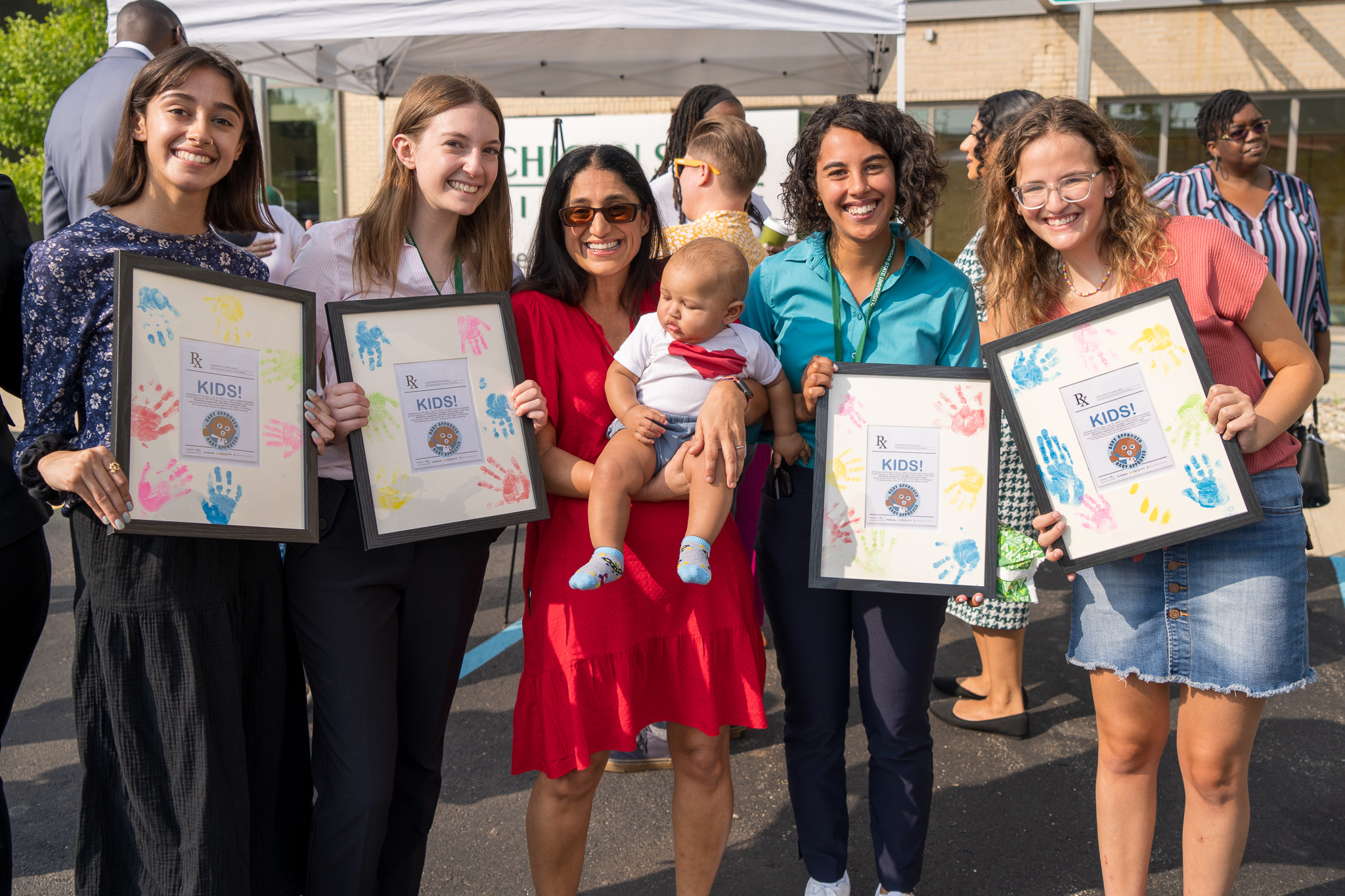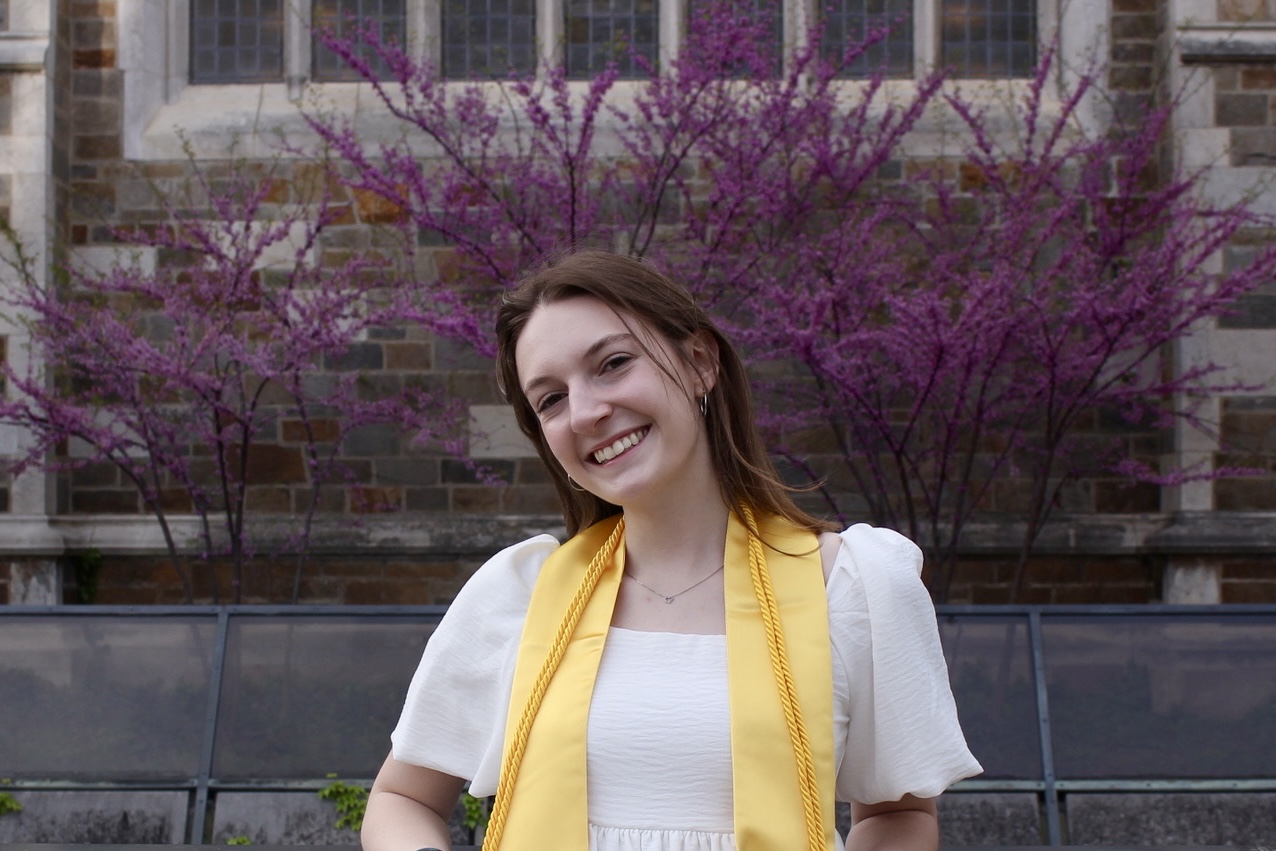Staff Voice: Giving Families the Hug They Need
January 21, 2025

Maya Wolock is the Rx Kids research assistant within the Michigan State University College of Human Medicine.
On my first day at MSU, as a student intern, I was greeted with one of the most memorable hugs of my lifetime. I was to work directly under Dr. Mona Hanna, a nationally recognized leader and award-winning pediatrician most known for her role in uncovering the Flint Water Crisis; it was a dream opportunity for any 20-year-old public health student, and I was a ball of nerves. As soon as Dr. Mona walked into the room, my worries evaporated as she threw open her arms and gave me a bear hug. “I’m a hugger,” she said. Dr. Mona’s hugs have a wide reach. That day, I was introduced to her greatest endeavor yet: to eliminate maternal and infant poverty in Flint and beyond. She and Professor H. Luke Shaefer run Rx Kids: a program offering ALL moms in a geographically defined area $1,500 during pregnancy and $6,000 in the first year of life. Launched in Flint, Rx Kids has already distributed over $5 million to 1,300 families in the year since its start. Now, the program is expanding to reach families in diverse, underserved communities all over the state, including the eastern Upper Peninsula, Kalamazoo and other communities in southeast Michigan.
Dr. Mona’s hugs have a wide reach. That day, I was introduced to her greatest endeavor yet: to eliminate maternal and infant poverty in Flint and beyond. She and Professor H. Luke Shaefer run Rx Kids: a program offering ALL moms in a geographically defined area $1,500 during pregnancy and $6,000 in the first year of life. Launched in Flint, Rx Kids has already distributed over $5 million to 1,300 families in the year since its start. Now, the program is expanding to reach families in diverse, underserved communities all over the state, including the eastern Upper Peninsula, Kalamazoo and other communities in southeast Michigan.
To moms of a new baby, balancing decreased income and increased expenses (diapers, car seats, formula), extra support in the form of cash can feel like a hug. Moms who receive support from Rx Kids are significantly more likely to endorse that they “feel loved”, compared to control groups. They’re more likely to feel hopeful, valued and respected. The cash “feels like a breath of fresh air” said Rx Kids mom Alana Turner.
Over 140 countries have, in various forms, recognized the financial burden that too often comes with parenthood, and offer families some form of cash support. The United States briefly joined this group with the expanded child tax credit of 2021, nearly cutting child poverty in half.
Poverty and economic instability during childhood are strong determinants of lifelong poor health. Our complex nervous system evolved to protect us from threats and respond to the adverse conditions created by living in poverty. Prolonged exposure to stressors triggered by living in poverty wreaks havoc on the body, impacting children’s physical and psychosocial development.
Researchers have, however, found that positive “relational health” can mitigate the negative impacts of childhood poverty: in other words, safe, stable and nurturing relationships are a protective factor against the pernicious effects of childhood poverty.
Enter child cash supports: an approach that not only lifts families out of poverty but can simultaneously help parents be there for their children, to offer them the safe, stable, and nurturing relationships that can buffer against the ill effects of poverty. Research shows that cash transfers are associated with improved food security, and decreased material hardship, both of which are associated with improved child health. Simultaneously, some research has found that recipients of cash transfers are less likely to exhibit symptoms of poor mental health. Extra financial assistance can relieve stress: no one synthesizes this better than Rx Kids mom Joan, who shares, “[Rx Kids has given me] reduced stress with the knowledge of some sort of financial cushion that can make sure I at least have a roof over my and my children’s head.”
Like Dr. Mona did for me on that first day, let’s give families the “hug” they need.
Today is January 21st, or as I prefer to call it, National Hug Day 2025. If you are also a “hugger,” I encourage you to hug your babies, your friends, your family, and, if possible, your legislators! With a focus on governmental efficiency and America-first economic policy, I’m thinking about how upcoming policies affect our most vulnerable. In the coming months, we are likely to see the implementation of steep tariffs that experts believe will increase the costs of weekly grocery trips and other essentials. Combined with concurrent cuts to government assistance, such as SNAP, families will have less in their wallets to afford these inflated costs.
The good news? Programs like Rx Kids are showing us that we have a potent policy solution to help families gain security and get by, offering families “…a little extra that lets you get things you need without feeling like you have to give up or sacrifice,” explains Lakyisha, mom to Rx Kids baby Nasir.
For National Hug Day, let’s reflect on how we care for one another. A hug is more than a way to say hello or goodbye: it’s support, its comfort, and its assurance that someone has your back. We need to invest in policies that give families that same security as a really great hug—giving families that extra support they need so they can thrive.


